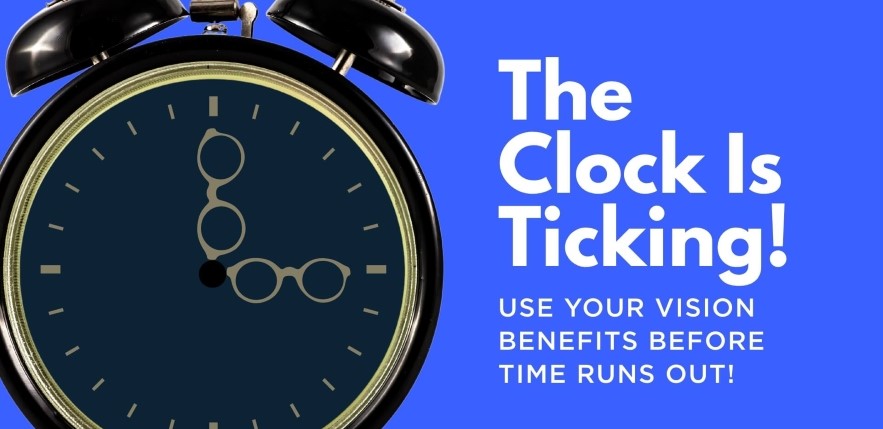As the year draws to a close, it’s essential to review your VSP vision insurance and Flexible Spending Account (FSA) or Health Savings Account (HSA) benefits to ensure you’re not leaving money on the table. Each year, Americans collectively forfeit approximately $400 million in unused benefits and FSA funds simply because they fail to use them before their expiration. With vision insurance and tax-advantaged accounts offering a variety of benefits, now is the perfect time to take advantage of them. The “use it or lose it” rule applies to most FSA funds and some VSP vision insurance benefits, meaning if you don’t spend them, they’re gone for good.
What Are VSP Vision Insurance, FSA, and HSA Benefits?
Vision Insurance, like VSP Vision and EyeMed, provides coverage for routine eye care, including comprehensive eye exams, prescription glasses, and contact lenses. Most vision insurance plans operate on an annual cycle, meaning any unused benefits may reset or expire at the end of the year.
Flexible Spending Accounts (FSA) and Health Savings Accounts (HSA) are tax-advantaged accounts allowing you to set aside pre-tax dollars for qualified medical expenses. FSAs often have a “use it or lose it” clause requiring you to spend the funds by December 31 or risk losing them. While HSAs are more flexible, unused funds roll over, making them an excellent long-term option for healthcare savings.
Why It’s Important to “Use It or Lose It”
The “use it or lose it” rule applies to most FSA benefits, meaning if you don’t use your funds before the year ends, that money is forfeited. Vision insurance operates similarly, with annual benefits resetting in January. Failing to take advantage of these benefits means you’re effectively leaving money unused that could have supported your health and well-being.
According to recent statistics, Americans forfeit approximately $400 million annually in unused FSA funds. This happens because many individuals don’t fully understand how to maximize their benefits or leave year-end planning until it’s too late. Vision insurance benefits often go unused as well, with people postponing eye exams or failing to update their eyewear.

What Can You Spend Your VSP Vision Benefits On?
If you’re scrambling to use your benefits before the year ends, here are some of the top ways to maximize your vision insurance, FSA, or HSA funds:
- Comprehensive Eye Exams
Ensure your vision is in top shape by scheduling a comprehensive eye exam. Most VSP vision insurance plans cover annual exams, but benefits may expire at the end of the year. An exam can detect changes in your prescription and catch early signs of eye conditions like glaucoma or macular degeneration. - Prescription Glasses
Vision insurance often includes an allowance for new prescription eyewear. Use this benefit to update your lenses, replace old frames, or invest in high-quality lenses with anti-reflective or blue-light-blocking coatings. Check out our top eyewear brands this year. - Contact Lenses Exams and Materials
If you wear contacts, use your benefits to pay for the CL fitting & evaluation and order an annual supply. Contact lenses are eligible expenses under both VSP vision insurance and FSAs, making them a practical year-end purchase. - Prescription Sunglasses (and some non-prescription sunglasses)
Protect your eyes from UV rays with prescription sunglasses. These are often covered under vision insurance and qualify as eligible FSA/HSA expenses. - Lens Enhancements
Upgrade your glasses with premium digital lens options such as anti-glare coatings, progressive lenses, or transition lenses. These enhancements can improve comfort and functionality, especially for all-day wear. - Dry Eye Treatments and Products
If you suffer from dry eye syndrome, FSA and HSA funds can cover treatments like Optase artificial tears, eyelid wipes and gel cleansers prescription eye drops, or even in-office procedures like Envision Lumecca IPL and Forma Radiofrequency - Specialty Contact Lenses
Custom contact lenses for conditions like keratoconus or severe astigmatism can be an eligible expense under FSA/HSA benefits. Check with your provider to see if these options are covered. - Eye Care Products
Stock up on essential eye care items like contact lens solution, cleaning wipes, or cases. These are often eligible for reimbursement through FSAs and HSAs. - LASIK Surgery
Thinking about LASIK? Vision correction surgery is an eligible expense under both FSAs and HSAs. Using these funds can significantly reduce the out-of-pocket cost for this life-changing procedure. - Specialized Treatments or Devices
Advanced treatments for eye diseases or assistive devices for low vision are also covered under many plans. If you have specific needs, now is the time to explore them.
Tips for Maximizing Your Benefits
- Plan Early: Don’t wait until December to review your benefits. Schedule appointments and order products early to avoid last-minute rushes and potential delays.
- Check Your Coverage: Review your vision insurance and FSA/HSA policies to understand what expenses are covered and how much you have left to spend.
- Keep Receipts: If you’re using FSA or HSA funds, save receipts for all eligible purchases. Many plans require proof of purchase for reimbursement.
- Bundle Purchases: If you need multiple items or services, group them together to maximize your spending and avoid leaving funds unused.
The Importance of Regular Eye Exams
Using your vision benefits for an annual eye exam isn’t just about avoiding waste—it’s a proactive step in maintaining your overall health. Eye exams can detect changes in your prescription and uncover early signs of systemic health issues like diabetes or hypertension. Ensuring your eyes are healthy supports productivity, comfort, and quality of life.
Why Choose Optical Illusions for Your Eye Care
At Optical Illusions: An Optometric Practice, we specialize in helping patients maximize their VSP vision insurance and FSA/HSA benefits. Our team provides comprehensive eye exams, premium eyewear options, and advanced diagnostic services to ensure you’re getting the most out of your benefits. With locations in San Jose, San Mateo, San Ramon, and Juneau, we make quality eye care accessible and convenient for the entire family.
Don’t let your benefits go to waste. Take advantage of the “use it or lose it” rule by investing in your eye health before the year ends! Schedule your next eye exam using your VSP Vision insurance with Optical Illusions today and use your FSA to give your eyes the care they deserve!



